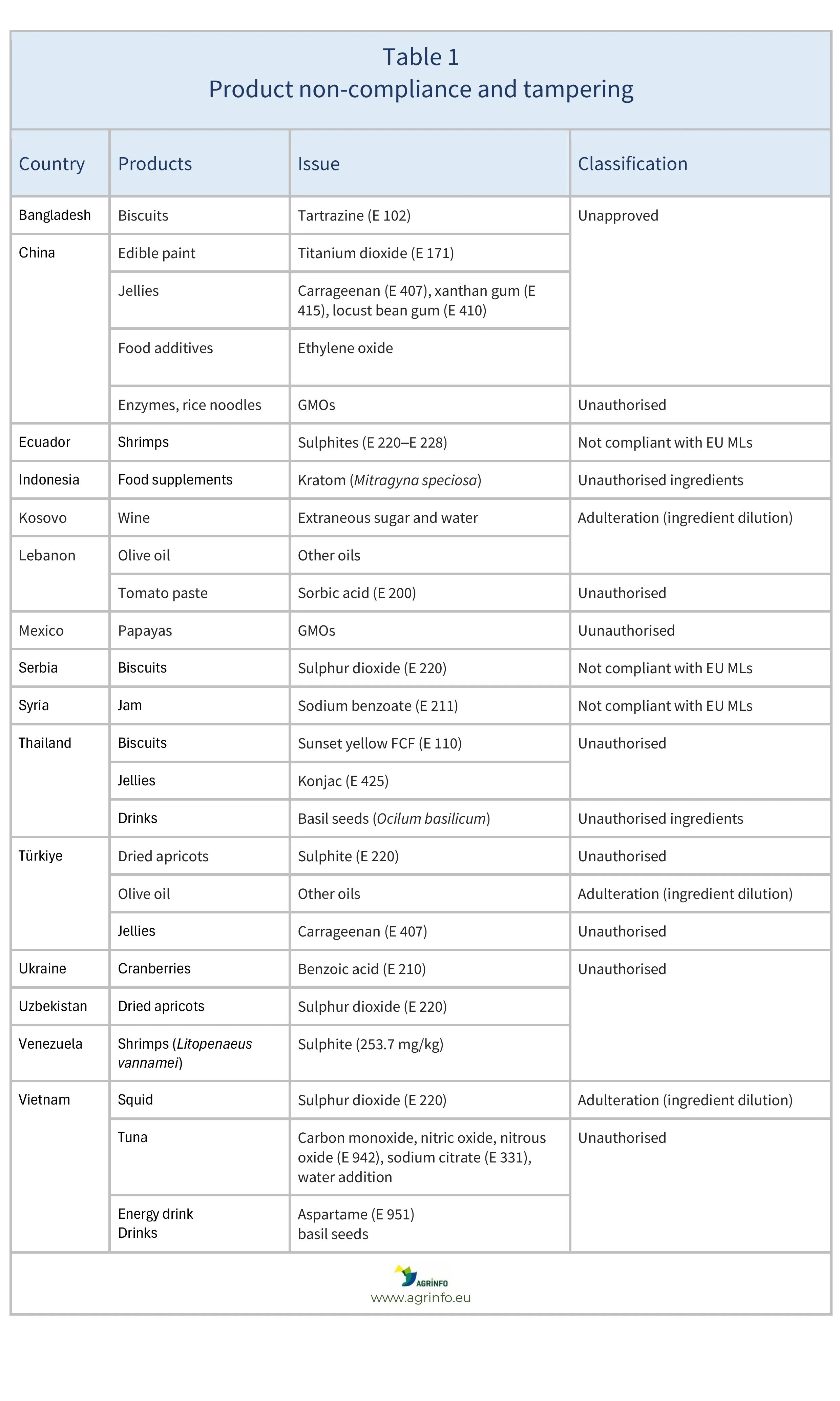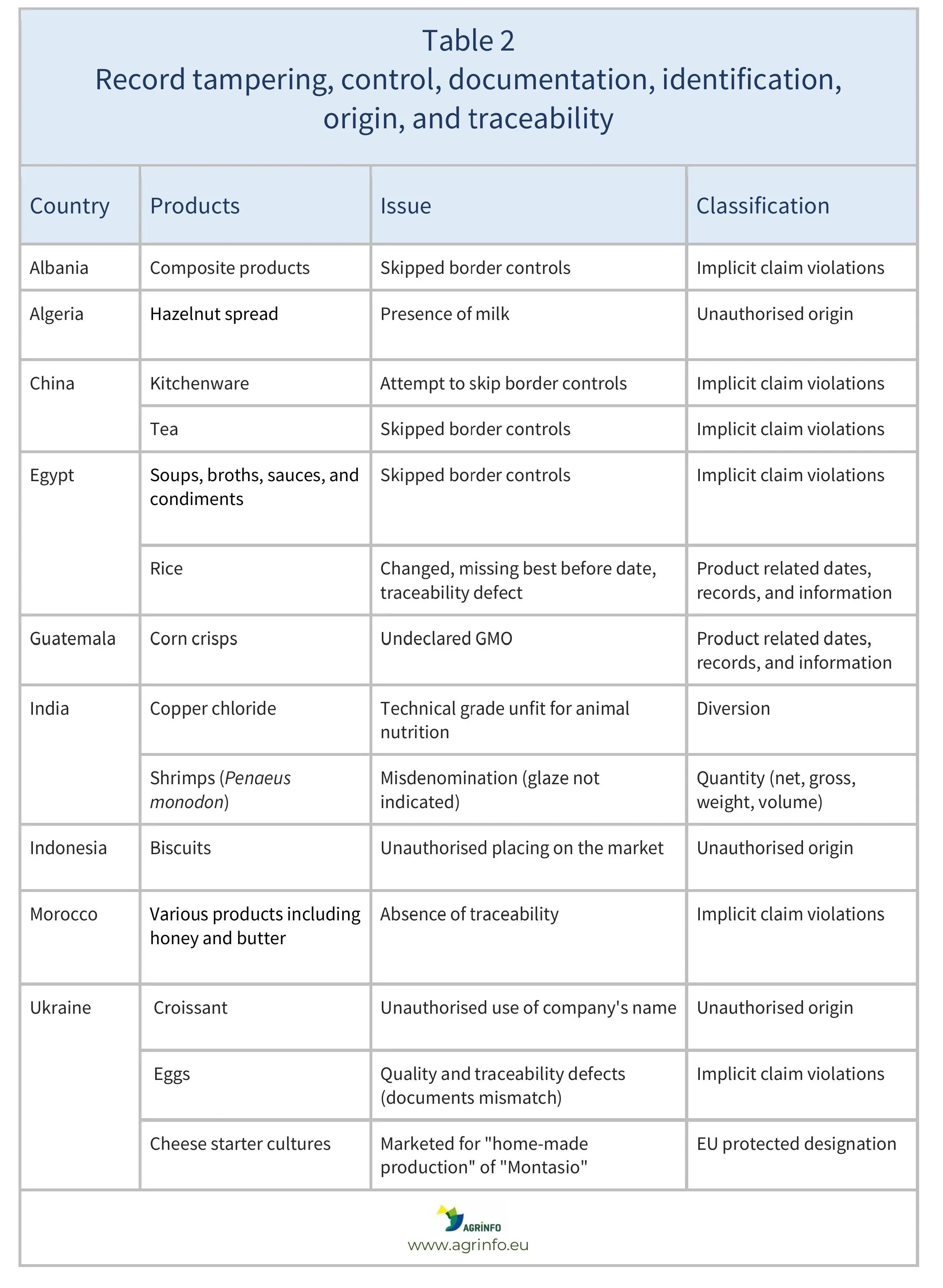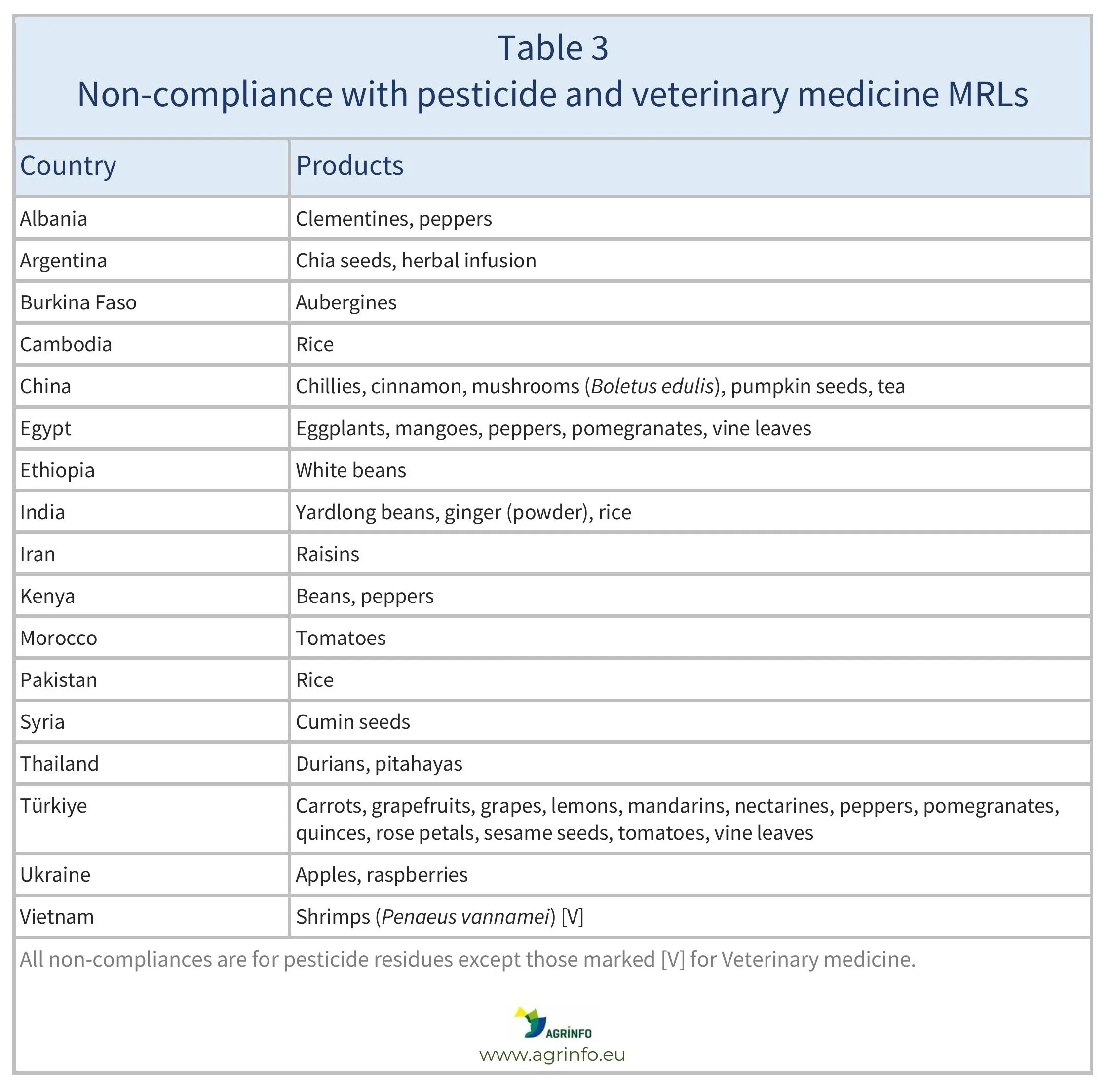Reports on non-compliance with EU food law and agri-food fraud: November 2024
- Feed safety
- Food safety
- Labelling
- Food safety controls
- Official controls
Summary
The European Commission publishes monthly overviews of foods that are not compliant with EU food law. The November 2024 report includes notifications concerning the following AGRINFO partner countries: Albania, Algeria, Argentina, Bangladesh, Burkina Faso, Cambodia, China, Ecuador, Egypt, Ethiopia, Guatemala, India, Indonesia, Iran, Kenya, Kosovo, Lebanon, Mexico, Morocco, Pakistan, Serbia, Syria, Thailand, Türkiye, Ukraine, Uzbekistan, Venezuela, Vietnam.
These monthly overviews highlight ongoing and emerging risks of non-compliance that will help agri-food exporters and competent authorities in non-EU countries to monitor and address risks that may affect trade.
Latest EU overview of food found not to comply with EU law
European Commission: November 2024 Report on Agri-Food Fraud Suspicions
Update
The European Commission publishes monthly overviews of foods that are not compliant with EU food law. The November 2024 report includes notifications concerning the following AGRINFO partner countries: Albania, Algeria, Argentina, Bangladesh, Burkina Faso, Cambodia, China, Ecuador, Egypt, Ethiopia, Guatemala, India, Indonesia, Iran, Kenya, Kosovo, Lebanon, Mexico, Morocco, Pakistan, Serbia, Syria, Thailand, Türkiye, Ukraine, Uzbekistan, Venezuela, Vietnam.
These monthly overviews highlight ongoing and emerging risks of non-compliance that will help agri-food exporters and competent authorities in non-EU countries to monitor and address risks that may affect trade.
Impacted Products
Cereals and bakery products; cocoa, coffee, tea; confectionery; cephalopods and their products; crustaceans and their products; dietetic foods, food supplements and fortified foods; eggs and egg products; feed materials; fats and oils; fish and fish products; food additives and flavourings; food contact materials; fruits and vegetables; herbs and spices; meat and meat products; milk and milk products; non-alcoholic beverages; other food products/ mixed (including honey and butter); poultry meat and its products; prepared dishes and snacks; soups, broths, sauces and condiments; wine
What is changing?
The November 2024 report includes notifications involving the following 28 AGRINFO partner countries:
Albania, Algeria, Argentina, Bangladesh, Burkina Faso, Cambodia, China, Ecuador, Egypt, Ethiopia, Guatemala, India, Indonesia, Iran, Kenya, Kosovo, Lebanon, Mexico, Morocco, Pakistan, Serbia, Syria, Thailand, Türkiye, Ukraine, Uzbekistan, Venezuela, Vietnam.
These notifications concern:
- product non-compliance and tampering (Table 1)
- record tampering; avoidance of control; false or deficient documentation (including mislabelling); identification, origin, and traceability defects (Table 2)
- non-compliance with maximum residue levels (MRLs) for pesticides and veterinary medicines (Table 3).
See RASFF notifications in November 2024.
Timeline
These reports are issued every month.
Recommended Actions
Competent authorities in countries that are included in these monthly overviews should pay attention to any non-compliances identified in the reports. It is particularly important that the producers/export companies concerned are informed as soon as possible so that they can take action and prevent a recurrence. These incidents also potentially indicate a more widespread problem that may require a coordinated response by the food sector in the country concerned.
Background
These monthly reports compile information notified to the EU’s Rapid Alert System for Food and Feed Network (RASFF), Administrative Assistance and Cooperation Network (AAC), and Agri-Food Fraud Network (FFN). The reports also include non-compliances with EU rules that do not present a risk, but have triggered investigations by the competent authorities of individual importing EU Member States.
Resources
Monthly reports on EU agri-food fraud suspicions
Regulation 2019/1793 on the temporary increase of official controls and emergency measures governing entry into the EU of certain goods from third countries
Regulation 2019/1873 on the procedures at border control posts for a coordinated performance by competent authorities of intensified official controls on products of animal origin, germinal products, animal by-products and composite products
Sources
European Commission: November 2024 Report on Agri-Food Fraud Suspicions
Tables & Figures
Disclaimer: Under no circumstances shall COLEAD be liable for any loss, damage, liability or expense incurred or suffered that is claimed to have resulted from the use of information available on this website or any link to external sites. The use of the website is at the user’s sole risk and responsibility. This information platform was created and maintained with the financial support of the European Union. Its contents do not, however, reflect the views of the European Union.
Latest EU overview of food found not to comply with EU law
European Commission: November 2024 Report on Agri-Food Fraud Suspicions
What is changing and why?
The European Commission publishes monthly overviews of foods that are not compliant with EU food law, including potentially fraudulent practices identified and reported by EU Member State authorities, based on Rapid Alert System for Food and Feed Network (RASFF) notifications, among other sources. These reports help stakeholders in the agri-food sector to identify risks and adapt monitoring strategies.
The November 2024 report includes notifications involving 28 AGRINFO partner countries: Albania, Algeria, Argentina, Bangladesh, Burkina Faso, Cambodia, China, Ecuador, Egypt, Ethiopia, Guatemala, India, Indonesia, Iran, Kenya, Kosovo, Lebanon, Mexico, Morocco, Pakistan, Serbia, Syria, Thailand, Türkiye, Ukraine, Uzbekistan, Venezuela, Vietnam.
See Tables 1–3 for details.
Actions
Competent authorities in countries that are included in these monthly overviews should pay attention to any non-compliances identified in the reports. It is particularly important that the producers/export companies concerned are informed as soon as possible so that they can take action and prevent a recurrence. These incidents also potentially indicate a more widespread problem that may require a coordinated response by the food sector in the country concerned.
Timeline
A report is issued every month.
For more information see the full record on the AGRINFO website – where you can also view the latest AGRINFO Update newsletters and search the database.
Tables & Figures
Disclaimer: Under no circumstances shall COLEAD be liable for any loss, damage, liability or expense incurred or suffered that is claimed to have resulted from the use of information available on this website or any link to external sites. The use of the website is at the user’s sole risk and responsibility. This information platform was created and maintained with the financial support of the European Union. Its contents do not, however, reflect the views of the European Union.



